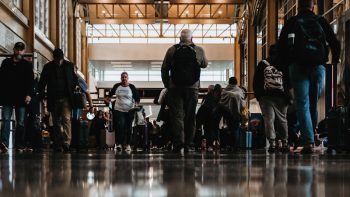
Transat announced its alliance with Flash Forest, a Canadian aerial reforestation company whose mission is to build healthy, resilient forests at scale through a data-driven, biodiversity-centric, and community-led approach.
Canada's once-forested areas are now in great need of replanting in the interests of the local communities, the boreal forest ecosystem, and the fight against climate change at large. Through this partnership with Transat, Flash Forest will plant an additional 29 hectares of forest over the next days in Assinica National Park, renowned for its verdant boreal forest. By 2025, Transat will have helped finance replanting a forest devastated by wildfires, with over 70,000 trees or 48 hectares. This will allow for the sequestration of nearly 29,411 tonnes of CO2 over the course of the trees' lifetime.
"We started discussing with Flash Forest last summer during the wildfire season. We were looking for a way to have a tangible long-lasting impact in our homeland through community investment, in line with our values and our approach to corporate responsibility. Flash Forest became an obvious choice for its unique and community-led approach. Almost a year later, it remains just as relevant and critical to restore the vital ecosystems that have been destroyed, further validating the need for organizations like Flash Forest. This initiative is only a small step in our journey toward a more environmentally responsible and sustainable future, and we hope to shed light on the important work Flash Forest is doing through this initiative," said Julie Lamontagne, Chief People, Corporate Responsibility and Communications at Transat.
Flash Forest's innovative approach to reforestation leverages drone technology, enabling greater precision and access to post-wildfire areas deemed unsafe or inaccessible for humans, combined with proprietary seedpods designed to maximize the success rate of plantation. Planting more than 10 times faster than humans, Flash Forest's seedpod technology is more sustainable than traditional tree planting methods, omitting the energy-intensive nursery phase. They are journeying to plant one billion trees and not stop there.
"As we embark on this exciting new partnership between Flash Forest and Transat, we are taking on the skies. By combining the latest aerial reforestation tech at Flash Forest with the global reach of Transat, we are restoring post-wildfire ecosystems at scale while bringing awareness to the localized effects that wildfires can have on small communities in our own backyard. Transat's tree planting partnership with Flash Forest demonstrates their commitment to sustainability and community involvement, while bolstering the Canadian clean tech space. We are proud to be working with such a passionate team," said Bryce Jones, CEO of Flash Forest.
Collaborating with Indigenous communities to drive greater impact
Communities like the Cree Nation of Oujé-Bougoumou in Eeyou Istchee, located about 20 kilometres north of Assinica National Park, are affected firsthand by wildfires. The Cree community of Oujé-Bougoumou was actively involved in creating the park in 2011 and practices traditional activities within its boundaries. The park is managed by the Cree Nation of Oujé-Bougoumou. To further drive sustainable impact, Flash Forest offers employment opportunities to the Indigenous communities it partners with, recognizing their expertise and contributions in environmental conservation and management.
By involving them in seed collection and reforestation plan development, Flash Forest can ensure that the right species are planted in the right places, leading to healthier and more resilient ecosystems. Hyperlocal seed collection is crucial for environmental restoration projects. First and foremost, it promotes ecological diversity by ensuring native plant species are used in reforestation efforts. Indigenous communities know the local flora intimately, including which species are best suited for particular environments.





